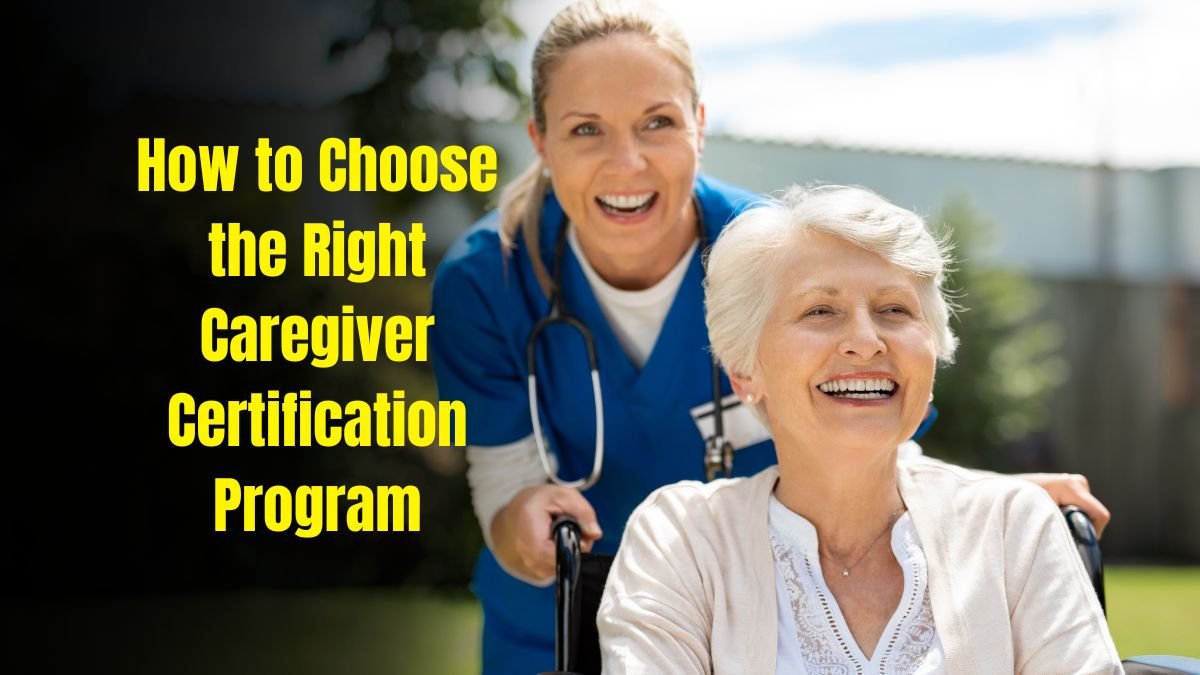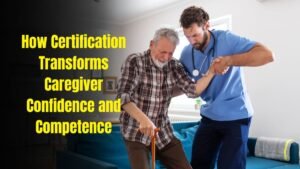Choosing a caregiver certification program isn’t just about picking the nearest school—it’s about matching your career goals with programs that meet current regulations, deliver recognized credentials, and help you pass required competency exams on the first try.
This 2025 guide distills the latest rules, training hour minimums, exam pathways, background screening expectations, and must-have add-on certifications so you can enroll with confidence and start working sooner.
Why Certification Choice Matters In 2025
Direct care is one of the fastest-growing parts of healthcare, but qualifications are not one-size-fits-all. Certified Nursing Assistants (CNAs), Home Health Aides (HHAs), Personal Care Aides (PCAs), and state-specific certified caregiver roles each follow different training hours, exam vendors, and continuing education rules.
Picking the right program affects your employability, wage potential, setting eligibility (hospital, nursing home, assisted living, home care), and ability to bill Medicare/Medicaid. Federal and state regulators continue to refine standards, so aligning with the most up-to-date requirements is essential in 2025.
Know The Major Caregiver Pathways
Certified Nursing Assistant (CNA)
- CNAs primarily work in nursing homes, hospitals, and long-term care. In 2025, all states require completion of a state-approved CNA program and a competency exam (written + skills). Minimum hour rules typically exceed the historical federal floor; state requirements vary and can be significantly higher than 75 hours.
Home Health Aide (HHA)
- HHAs support patients in their homes. For Medicare/Medicaid-certified agencies, federal regulations require at least 75 training hours, a competency evaluation, and 12 hours of annual in-service training. States may mandate more hours and specific topic coverage (e.g., dementia).
Personal Care Aide (PCA)
- PCAs often provide non-medical personal assistance. There is no federal minimum training standard for PCAs; states and agencies set their own rules. Some states align PCA hours to HHA/CNA standards; others use lower or modular requirements. Verify the latest state chart before enrolling.
State-Specific “Certified Caregiver” Roles
- Example: Arizona Certified Caregiver—62 total training hours and a state exam overseen by the Arizona Board of Nursing Care Institution Administrators & Assisted Living Managers (NCIA). Many assisted living employers require this credential for direct care roles.
Core 2025 Requirements: Hours, Exams, And In-Service
- Training Hours (Starting Point):
- HHA: Minimum 75 hours federally (states may require more).
- CNA: State-set (commonly ≥ 75 hours) through a state-approved program.
- PCA: No federal minimum; check state/agency rules.
- AZ Certified Caregiver: 62 hours + exam.
- Competency Exams:
CNA/NA exams combine written (or oral) and skills demonstrations and are administered by approved vendors (e.g., Pearson VUE, Prometric) under state authority. Note: NCSBN no longer develops/owns NNAAP/MACE content; states coordinate vendors and content. - Annual In-Service (HHAs):
12 hours per 12-month period minimum, often RN-supervised, and may be delivered while on duty.
Add-On Credentials Employers Expect
- CPR/BLS (Healthcare Provider Level):
Most employers require current CPR/BLS from AHA or equivalent; renewal typically every two years. Pediatric modules (PALS/PEARS) may be preferred in pediatric settings; stroke modules (ASLS) can help in hospital/rehab environments. - Background Checks & Health Clearances:
Expect a state check plus, in many roles, FBI fingerprinting (Live Scan or FD-258). Some states updated screening rules for 2025 and beyond; for instance, Washington requires both state + FBI checks for private home-care agency workers; Florida highlights screening at licensure/renewal as of July 1, 2025. Agencies also typically require TB screening, immunization verification, and drug testing.
Program Accreditation And Approval: What To Look For
- State Approval: Your program must be on the state’s approved list (Board of Nursing or Department of Health/aging services). Without this, you may be ineligible to test or work in regulated settings. CNA and HHA candidates should confirm the provider’s current approval status.
- Meets 2025 Hour/Content Standards: Verify total hours, clinical/lab time, and required topic coverage (e.g., infection control, patient rights, dementia care). Many states mandate content beyond the federal baseline.
- Exam Readiness: Look for schools that teach to the state exam blueprint, offer skills labs, mock exams, and provide test scheduling support with the state’s vendor. (Pearson VUE/Prometric/state test center varies by state.)
- Clinical Placement Quality: Confirm supervised clinical hours occur in approved facilities and are scheduled early enough to keep you on pace to test shortly after graduation.
- Documented Outcomes: Ask for first-time pass rates, job placement rate, and employer partnerships.
Online, Hybrid, Or In-Person: What Works In 2025?
- HHAs and CNAs must complete hands-on clinical skills in person. Many states now accept hybrid delivery (theory online + in-person labs/clinicals), but the school must remain state-approved and meet hour minimums.
- For PCAs, flexibility is greater since federal minimums don’t apply; still, employer preference and state rules dictate the format.
State-By-State Differences You Cannot Ignore
- Training Hour Variation (CNA): States set their own thresholds; some require substantially more than 75 hours (e.g., 100–120+). Confirm your state’s 2025 chart before enrolling.
- HHA Add-Ons: States may require dementia, Alzheimer’s, or behavioral health modules beyond the federal minimum.
- Special Credentials: Arizona’s 62-hour caregiver certificate is distinct from CNA/HHA and is assisted-living-focused; it requires a state exam (often 75% to pass) and is recognized by in-state employers.
Cost, Timing, And Scheduling Considerations
While exact tuition varies, you should verify:
- Total Calendar Length: Programs range from fast-track (a few weeks) to multi-month cohorts depending on hours and clinical slot availability.
- Class Times: Evening/weekend options can accelerate or delay completion.
- Exam Scheduling: Choose providers that reserve skill-lab time and help book your state exam as soon as you’re eligible.
- Included Fees: Ask whether textbooks, uniforms, background checks, immunizations, and exam vouchers are included.
(These are program-level variables—always verify locally alongside the 2025 hour and exam rules cited above.)
Red Flags That Disqualify A Program
- Not on the state’s approved list (you risk being barred from testing or employment).
- Promises of certification without hands-on skills for CNA/HHA roles.
- No clear exam prep for your state’s vendor.
- Outdated hour totals (e.g., ignoring the 75-hour HHA federal floor or state-specific CNA hours).
- Missing CPR/BLS or background screening guidance required by employers and state law.
Quick Comparison Table (2025)
| Role / Credential | Minimum Training Hours | Oversight / Approval | Exam & Competency | Ongoing Requirements | Typical Work Settings |
|---|---|---|---|---|---|
| CNA (Certified Nursing Assistant) | State-set (commonly ≥75; often 100–120+) | State Board of Nursing/Health; program must be state-approved | Written/skills via state vendor (e.g., Pearson VUE/Prometric) | State-specific CE/in-service rules | Nursing homes, hospitals, long-term care |
| HHA (Home Health Aide) | ≥75 hours (federal) + state add-ons | Medicare/Medicaid agencies require federally compliant training; states may add content | Competency evaluation after training | 12 hours/year in-service minimum | Home health, hospice (home setting) |
| PCA (Personal Care Aide) | No federal minimum; state/agency-set | State/agency standards; verify employer acceptance | Usually competency/skills check (varies) | Often agency in-service | Non-medical home care, assisted living |
| Arizona Certified Caregiver | 62 hours | NCIA Board (AZ); state-approved program | State caregiver exam (passing score typically ≥75%) | Employer-specific; CE varies | Assisted living, memory care |
Step-By-Step: How To Choose The Right Program
- Define Your Target Setting
Decide where you want to work—hospital/NH (CNA), home health (HHA), non-medical home care (PCA), or assisted living (state caregiver)—then pick the credential that unlocks that setting. - Pull The Official 2025 Requirements
Check your state’s approved program list and hour minimums. For HHAs, confirm the program meets 42 CFR §484.80; for CNAs, verify state approval and testing pathway. - Verify Clinicals & Skills Lab
Ensure the school schedules supervised clinicals in approved sites and offers skills check-offs that mirror your state exam vendor. - Confirm Exam Logistics
Ask about practice tests, mock skills, pass rates, and vendor scheduling support (Pearson VUE/Prometric/state site). - Check Add-On Requirements
Will the program help you obtain CPR/BLS, TB screening, immunizations, and background checks (state + FBI if required)? - Assess Flexibility & Speed
If you need to work quickly, prefer hybrid or accelerated tracks that still meet hour minimums and maintain state approval. - Ask About Placement & Employer Links
Employer partnerships, job fairs, and referrals increase your odds of day-one employment post-certification.
Frequently Overlooked But Crucial Details
- In-Service And CE Planning:
HHAs must complete 12 annual hours; some employers extend similar expectations to CNAs/PCAs. Pick programs that teach a plan for staying compliant. - Expiration Windows:
CPR/BLS cards typically last two years; enroll with providers who make renewals simple (AHA training centers are widely accepted). - Background Rechecks:
Some states require periodic re-screening or new checks on license renewal; agencies may run additional checks on employment changes. - Portability Across States:
Credentials don’t always transfer seamlessly. If you may move, choose widely recognized pathways (CNA/HHA) and keep skills logs and syllabi.
Practical Checklist Before You Enroll
- Match role & setting (CNA, HHA, PCA, AZ caregiver, etc.).
- State-approved provider confirmed.
- Meets 2025 hour rules (≥75 for HHA; state-set for CNA; state/agency for PCA; 62 for AZ caregiver).
- Exam alignment (vendor, mock skills, pass rates).
- Clinicals scheduled in approved sites.
- CPR/BLS and background checks included or supported.
- In-service/CE plan for year one.
- Clear tuition & fees (books, uniforms, exam vouchers, screenings).
Example Pathways (2025 Snapshot)
- Goal: Hospital/Nursing Facility bedside care → Choose CNA.
Enroll in a state-approved CNA program with robust skills lab and vendor-aligned exam prep; confirm state hour requirement (often ≥100). - Goal: Medicare/Medicaid home health → Choose HHA.
Verify the program meets 42 CFR §484.80 (≥75 hours + competency eval + 12 hrs/year). Ask about RN-supervised in-service. - Goal: Assisted Living in Arizona → AZ Certified Caregiver.
Complete 62 hours, then pass the NCIA exam (≥75% typical). Many AZ assisted living employers require this credential. - Goal: Non-medical home care (varied states) → PCA.
Ensure the training matches state/agency expectations; consider CPR/BLS and dementia modules for employability.
The “right” caregiver certification program in 2025 is the one that matches your target workplace, is approved by your state, meets current hour and competency standards, and prepares you to pass the state exam quickly.
Prioritize programs with hands-on skills training, exam-vendor alignment, clear in-service plans, and support for CPR/BLS and background checks. With these boxes checked, you’ll move from training to employment faster, legally compliant, and career-ready.
FAQs
What’s the minimum number of hours I need for HHA training in 2025?
The federal minimum is 75 hours for HHAs at Medicare/Medicaid-certified agencies, plus a competency evaluation and 12 hours of annual in-service. Some states require more.
Do CNA programs have a national hour minimum?
CNA hour requirements are state-set. Many states require 100–120+ hours, and all require completion of a state-approved program and a written + skills exam.
Is there a federal standard for Personal Care Aide training?
No. PCAs have no federal minimum; states and agencies define standards. Check your state’s 2025 guidance and employer requirements.




